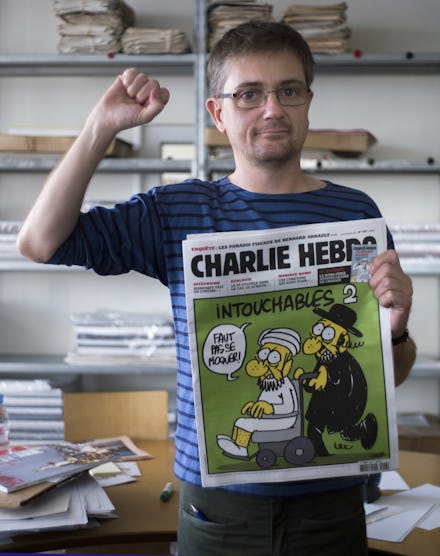Slain 'Charlie Hebdo' Editor's Book, Finished Days Before Attack, to Be Released

When the Paris offices of French satirical newspaper Charlie Hedbo were bombed in November 2011, then editor-in-chief Stéphane Charbonnier, who died in this January's attacks, reportedly said, "We are against all religious fundamentalism but we are not against practising Muslims. We are for the Arab Spring, and against the winter of fanatics," according to the Express.
This week, his words live on in the form of a book to be published posthumously Thursday that eerily foreshadowed the violence he and his staff would undergo in a deeply politicized cultural environment marred by Islamophobia and racism.
Three months after the murder of 12 Charlie Hebdo newspaper staffers, Charbonnier is getting the most Hebdo-ian last word ever in his book titled Open Letter to the Fraudsters of Islamophobia Who Play Into Racists' Hands.
Finished just two days before the shooting, the short book defends the satirical weekly paper, which gained the height of its infamy from regularly publishing drawings of the Prophet Muhammed.
The 120-page publication, which includes no new caricatures, according to the New York Times, underscores Charbonnier, better known as Charb, taking issue with the media's creation of an environment fanning the flames targeting Charlie Hebdo.
"It is because the media decided that republishing the Muhammad caricatures could only trigger the fury of Muslims that it triggered the anger of a few Muslim associations," Charbonnier wrote in regards to 2006, when his paper reprinted the Danish newspaper Jyllands-Posten's cartoons of Muhammad.
In capitalizing on and championing Islamophobia, Charbonnier says, media messaging detracts from the bigger, more important issue of racism. "A lot of those who campaign against Islamophobia don't actually do it to defend Muslims as individuals, but to defend Prophet Mohammed's religion," he wrote, according to France24.
But on a larger scale, Charb wanted to make the point that all religions, including Islam, are subject to ridicule.
"To be afraid of Islam is without a doubt moronic, absurd and many other things as well, but it's not an offense," he wrote in the upcoming book, excerpts of which are posted on the French website L'Obs. "The problem isn't the Quran, nor the Bible, [two] badly written, incoherent and soporific novels, but the believer who reads the Quran or the Bible like one reads an instruction manual on how to assemble an Ikea shelf."
L'Obs also released a number of other excerpts from the upcoming book, which, roughly translated, read:
The Sarkozy years
"In France, racist speech was widely liberated by Sarkozy and his debate on national identity. When the highest state authority is aimed at idiots and bastards and tells them: "Let it go, you guys," what do you think the idiots and bastards do? They begin to say publicly that they were merely, until then, bawling at the end of too boozy family meals."
Islamophobia, a badly tailored concept
"The minority militants trying to impose on judicial and political authorities the notion of 'Islamophobia' have no other purpose than to push the victims of racism to be assertive Muslims (...) If tomorrow the Muslims of France converted to Catholicism or renounce any religion, it will not change the racist discourse: these foreigners or these French of foreign origin will always be designated as responsible for all evil."
Islamophobia, new anti-Semitism?
"In 1931, were there international terrorists who claimed Orthodox Judaism? Were jihadist Jews threatening to create the equivalent of Sharia in Libya, Tunisia, Syria, Iraq? Did a Rabbi Bin Laden send a biplane to crash against the Empire State Building? (...) No, Islamophobia is not the new anti-Semitism. There is no new anti-Semitism, there is this old, ugly and immortal racism. A racism whose victims are people of Muslim origin. "
As terrorists seek to silence media through displays of violence, like the murders of foreign journalists, or attempting to hack the websites of anti-Islamic State affiliates, Charbonnier and Charlie Hebdo's message urges journalists around the world not to cater to extremists bent on quashing free speech. Instead it tells us to speak louder, to ring clear over the din of oppression. Je suis Charlie.